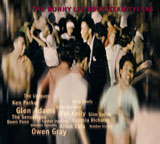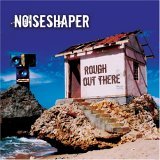Home » Jazz Articles » Multiple Reviews » Bunny Lee and Noiseshaper: Rocksteady to Dub and Beyond
Bunny Lee and Noiseshaper: Rocksteady to Dub and Beyond
 Various Artists
Various Artists
The Bunny Lee Rocksteady Years
Moll-Selekta
2005
The historical heyday of Jamaican popular music was driven by a very active local recording scene, paired with and carefully calibrated to serve sound systems that kept listeners dancing all night long. Rocksteady, the second major chapter in the island's musical development, probably came about because audiences had grown tired of the faster-paced and instrumentally-dominated strains of ska. The new wave hit shores in the late '60s through seminal efforts by Hopeton Lewis, Roy Shirley, and Derrick Morgan—as well as the sure-fire star power of Alton Ellis, who popularized the new term through his hit "Come Do The Rock Steady."
Rocksteady brought the bass to the foreground of the music, providing it a central role in anchoring and propelling relaxed riddims, as well as laying down a flexible foundation for vocalists. A massive wave of singers, often very young, stepped to the mic and dug deep into American soul and R&B traditions as they fashioned their own hybrid music. Producers like Coxsone Dodd and Duke Reid continued to play influential roles behind the scenes, but rocksteady saw the emergence of a new force who would continue to be active through the late '70s: Bunny "Striker" Lee.
This collection includes 25 relatively short singles (none longer than 4:08) which Lee shepherded to the sound systems during the fertile early years of rocksteady, earning him the nickname "Striker" for his ability to crank out hits. Look for classics like "My Conversation" and "Let Me Go Girl," sung by the Uniques and Slim Smith, respectively; as well as other tunes by Owen Gray, Ken Parker, and the Sensations (who dominate the mix with four songs).
The romance-heavy lyrics and soulful singing of rocksteady can be a bit overwhelming to unfamiliar ears, but this collection (like each of the eleven historical releases that Moll-Selekta has put out) maintains a healthy degree of variety throughout. It's sort of surreal to hit play on this record and experience wave after wave of youthful song—like stepping into a time capsule and landing at a yard party in 1968, in an innocent and joyous time before the Rastafarians darkened roots reggae and dub turned it into a shadowy memory.
 Noiseshaper
Noiseshaper
Rough Out There
Echo Beach
2005
After its invention in Jamaica in the early '70s, dub saw a dramatic rebirth with the advent of electronic production and hip-hop/remix culture. It's stayed a popular medium for musical expression because just about anybody with the right tools can generate the rolling basslines, timeshifting drums, and spaced-out psychedelic effects that form its core. To do dub right, though, is another thing entirely, and that's a gift possessed by the rare few. (Witness Stefan Betke's brilliant '90s experiments with glitchtronica as Pole, for example.) Interestingly, dub and its relatives have become a pretty hot thing in Europe, driven by an active, open-minded nightclub culture.
Noiseshaper, a duo of Axel Hirn and Flo Fleischmann (originally from Vienna but now living in London and Berlin), recognized the power of dub to hybridize with other genres pretty early on. Their very effective second album, The Signal, commingled dub with funk and electronica, presenting a rotating cast of vocalists at the mic. The brand new Rough Out There continues along a similar theme, though one vocalist fronts the group most of the time: Juggla. His voice is not particularly colorful or quirky, but his insistence on the melody keeps the music focused, and he's got an interesting way of twisting dark lyrics into ear candy.
The music on Rough Out There is uniformly accessible and friendly, with heavy bass and drums that keep shifting around in order to avoid machine-like tendencies. Words like downtempo and chillout come to mind at times, but this is creative stuff, not saccharine taffy. Check out the tongue-in-cheek snippets of Chinese melody on the R&B/dub trip "Kung Fu Fighting"; the fire-fueled momentum of the ragga/rap anti-war anthem "Automatic"; and the groovy benzo slowdown of the title track about trust, war, and lies. Michael Madden, who wrote most of the lyrics, has direct aim but also a taste for the poetic twist.
Very few bands can make a record this catchy and accessible without dumbing it down. Credit Noiseshaper for keeping the creative flame alive, mixing things up in fresh ways, and getting down and deep into the groove just about every time. Two thumbs up!
Visit Noiseshaper on the web.
Track and Personnel Listings
The Bunny Lee Rocksteady Years
The Sensations: Lonely Lover; The Uniques: My Conversation; Glen Adams: Hey There Lonely Girl; Owen Gray: Take Me Back; Dawn Penn: Long Day Short Night; Ken Parker: How Could I; Slim Smith: Let Me Go Girl; Winston Samuels: Don't Believe Him; Errol Dunkley: King And Queen; Pat Kelly: The Dark End Of The Street; Alton Ellis: Loving Mood; The Sensations: Right On Time; Glen Adams: I Can't Help It; Alva Lewis: In The Park; The Sensations: Long Time Me No See You Girl; Cynthia Richards: Forever; Ken Parker: Somebody To Love; Dawn Penn: To Sir With Love; Errol Dunkley: I'm Going Home; Slim Smith: Build My World Around You; Glen Adams: Hold Down Miss Winey; Owen Gray: Come Back To Me; The Sensations: Born To Love You; Webber Sisters: What I'm Gonna Do; Lester Sterling with King Cannon: Man At Work.
Rough Out There
Tracks: Automatic; Walls Of Silence; This Is Not A Gunthing; Rough Out There; Walking; Ruff Like A What; Daemons; Perdido; Bushmaster; Kung Fu Fighting.
Personnel: Axel Hirn and Flo Fleischmann: music and production; Juggla: vocalist; Dennis Bovell: bass; Vido Jelashe: backing vocals; Jackie Deane: vocals and backing vocals; Clemens Handler: bass; Gernot Kogler: acoustic guitar; Hector Hernandez: acoustic guitar; Justine Electra: vocals.
< Previous
Redefinition
Comments
Tags
For the Love of Jazz
 All About Jazz has been a pillar of jazz since 1995, championing it as an art form and, more importantly, supporting the musicians who create it. Our enduring commitment has made "AAJ" one of the most culturally important websites of its kind, read by hundreds of thousands of fans, musicians and industry figures every month.
All About Jazz has been a pillar of jazz since 1995, championing it as an art form and, more importantly, supporting the musicians who create it. Our enduring commitment has made "AAJ" one of the most culturally important websites of its kind, read by hundreds of thousands of fans, musicians and industry figures every month.


















